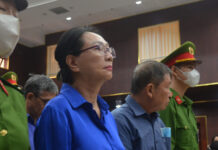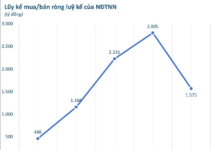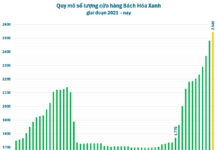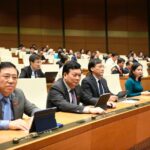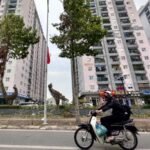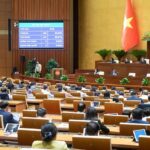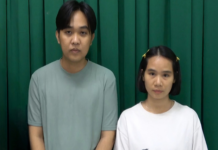The pilot scope applies to a number of criminal cases under the direction and guidance of the Central Steering Committee for Corruption, Wastefulness, and Negative Behavior Prevention and Control.
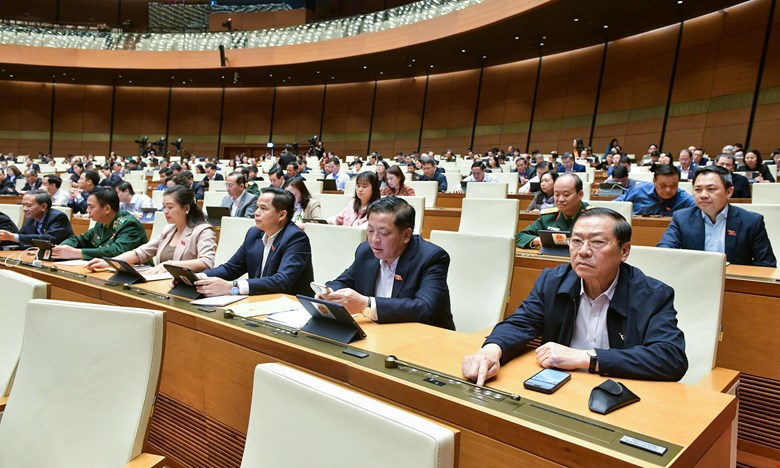
National Assembly deputies vote to pass the Resolution. Photo: Ho Long
The National Assembly’s resolution outlines five measures for handling exhibits and assets. First, the measure of returning money to the victim or depositing it in a bank pending further processing is implemented. Second, the measure of depositing a security to lift the seizure, detention, attachment, or freeze of exhibits or assets is established. Third, the sale or transfer of exhibits and assets, along with the handling of proceeds from such transactions, is permitted. Fourth, the transfer of exhibits and assets to their lawful owners or managers for administration, operation, or utilization is facilitated. Fifth, a temporary suspension of transactions or a freeze on the registration, transfer of ownership, or the right to use assets is allowed.
Regarding the measure of depositing security to lift the seizure, detention, attachment, or freeze of exhibits or assets, the resolution clarifies that in cases where the exhibits or assets are real estate, attached assets, securities, or equipment, means of transport, or supplies in production, business, or services that have been seized, detained, attached, or frozen, and they are legally owned or managed by the accused or other related organizations or individuals, if they express a need to utilize these assets and submit a written request to deposit security to retrieve them, the prosecuting agency shall request an assessment and valuation of the exhibits and assets in accordance with the law. Subsequently, a decision will be made to allow the accused or the organization or individual to deposit security to lift the seizure, detention, attachment, or freeze of the said exhibits or assets. The amount of security deposited must not be lower than the assessed value of the exhibits or assets.
The security deposit is to be paid into an account held by the prosecuting agency at a state-owned commercial bank with more than 50% state capital. After the security deposit is paid into the account, the prosecuting agency shall decide to lift the seizure, detention, attachment, or freeze measures previously applied. The recipient of the returned assets is responsible for their preservation during the management, operation, or utilization process.
Concerning the measure of selling or transferring exhibits and assets, along with handling the proceeds, the resolution specifies that in cases where the exhibits or assets are real estate, attached assets, securities, or equipment, means of transport, or supplies in production, business, or services that have been seized, detained, attached, or frozen, and they are legally owned or managed by the accused or other related organizations or individuals, and there are no disputes, the sale or transfer of these exhibits or assets shall be permitted in accordance with the law. If the accused or related organizations or individuals submit a written request for the sale or transfer, the prosecuting agency shall request an assessment and valuation of the exhibits and assets and decide on the sale or transfer through a public auction in accordance with the law. However, if the asset is jointly owned, and one of the owners purchases it, an auction is not required.
The organization or individual purchasing or receiving the transferred exhibit or asset must transfer the entire proceeds from the sale or transfer into an account held by the prosecuting agency at a state-owned commercial bank with more than 50% state capital. After the money is transferred into the account, the prosecuting agency shall decide to lift the seizure, detention, attachment, or freeze measures previously applied.
This resolution takes effect on January 1, 2025, and will be implemented for a period of three years.
Prime Real Estate Opportunities: Transforming Agricultural and Non-Agricultural Land into Thriving Commercial Residences
On November 30, with the majority of delegates present in agreement, the National Assembly passed a resolution on a pilot project for commercial housing development through agreements on the transfer of land use rights or the use of land already with such rights.
Why Did Hanoi Only Approve One Social Housing Project in 2024?
As of now, Hanoi has seen only one social housing project granted a construction permit this year, and even this enterprise continues to face numerous challenges. Experts are advocating for a National Assembly Resolution on social housing development to address these issues and facilitate much-needed progress in this sector.
The Ultimate Guide to Mastering the Art of Persuasive Writing: “Unleashing the Power of Words: Crafting Compelling Content for Maximum Impact”
On November 29, the 15th National Assembly continued its 8th session, during which the Law on Public Investment (amended) was passed with notable new features. This landmark decision was supported by the majority of delegates, signifying a pivotal moment in the nation’s public investment landscape.






